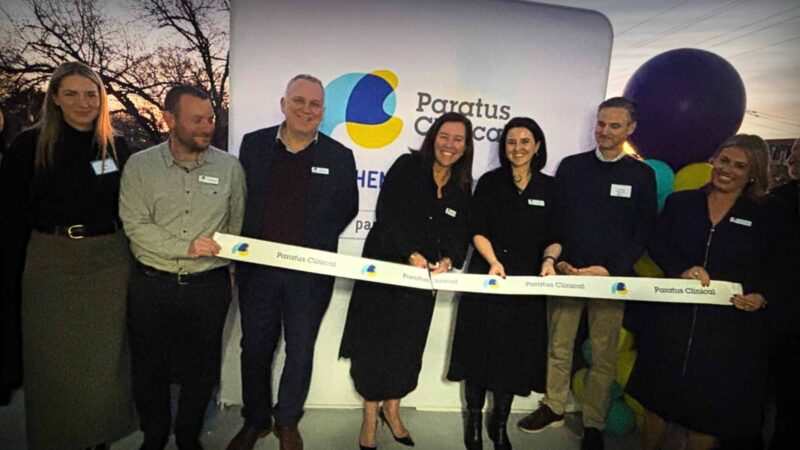IMPERATIVE NEED TO IMPROVE OUTCOMES FOR WOMEN DIAGNOSED WITH OVARIAN CANCER. ANZGOG Chair gives stark assessment on late diagnosis, limited treatment options and significantly low survival rates
With
Professor Clare Scott, Chair
Australia New Zealand Gynaecological Oncology Group (ANZGOG) &
Clinician Scientist
WEHI The Walter and Eliza Hall Institute of Medical Research &
Medical Oncologist, Peter MacCallum Cancer Centre, The Royal Women’s Hospital and The Royal Melbourne Hospital
Australian Health Journal Talk
Filmed Online | April 2025
Professor Clare Scott, a pioneering clinician scientist at the Walter and Eliza Hall Institute of Medical Research in Melbourne, also serves as a medical oncologist at Peter MacCallum Cancer Centre, the Royal Melbourne Hospital, and the Royal Women’s Hospital.
Her comprehensive training in medical oncology has fuelled her specialisation in gynaecological cancer, combining rigorous research with clinical trials to improve patient outcomes. With over a decade of involvement in ANZGOG, Australia’s foremost gynaecologic cancer research organisation, she is deeply committed to advancing research and saving lives.
ANZGOG’s values—excellence, impact, equity, collaboration, and openness—reflect the organisation’s dedication to transformative cancer research. Its strategic plan is designed around four comprehensive goals, aiming to initiate innovative, practice-changing gynaecological cancer research. This not only expands the reach of impactful studies but also ensures that research directly benefits the community, ultimately improving the lives of countless women affected by these cancers.
Ovarian cancer, a complex and diverse group of diseases, poses significant challenges in diagnosis and treatment. While high-grade serous ovarian cancer is often highlighted, other rare types also demand critical attention. With projections indicating over 1,800 Australian women will be diagnosed by 2025, and a startling survival rate of just under 50%, Professor Scott talks of the need to rally together to confront this pressing public health issue. Tragically, two-thirds of cases are diagnosed at an advanced stage, diminishing survival prospects further. As of now, around 5,300 Australian women live with ovarian cancer, facing ongoing challenges that necessitate urgent action and support.
In this Australian Health Journal Talk, Professor Scott talks in detail about the following –
- The incidence of ovarian cancer in Australian women and mortality statistics around advanced stage diagnosis
- The symptoms and why they get dismissed or misdiagnosed
- The challenges in access to screening, treatment and funding for research
She also delivers a message to the medical community and the Australian Government.
Source: Generative AI on transcript
You Might also like
-
Strong primary care nursing solutions for a healthier Australia
The CEO of Australian Primary Health Care Nurses Association (APNA), Ken Griffin spoke with Australian Health Journal about the following:
– APNA President Karen Booth representing Primary Care Nursing in the Australian Government led Strengthening Medicare Task Force
– The current key challenges in primary care nursing
– Programs on diversity and student placement proposed in APNA’s pre-budget submission to Federal Government
– A proposed initiative called Nurse-Supported Self-Care, with broadening role primary care nursing would play in the community
– Hopes for other health priorities addressed in the Federal BudgetIn the lead up to the Australian Federal Budget in May 2023, Australian Health Journal reached out to peak health industry bodies to hear about their priorities, either noted in pre-budget submissions lodged with Federal Government in January 2023 or in recent forums such as the Strengthening Medicare Taskforce.
-
Clinical trial site in primary care setting open for novel therapies in psychiatry
Over the past decade, Paratus has been involved in over 200 clinical trials across 4 clinical site locations. Now a fifth site, the newly opened Melbourne site will cater to both primary care and psychiatry, specifically designed for psychedelic studies.
The new Melbourne site will be a focused on primary care studies specifically expanding access to psychiatric research, a growing area of unmet need. Australian Health Journal met with 3 recent hires brought in to support clinical trials across the organisation and in psychiatry in Melbourne.
-
Allied Health Building Leadership Experience in Tasmania
A notable program run by Hospitals South is the ABLE program, or Allied Health Building Leadership Experience. This program was created to address the challenge of allied health professionals being seen as a single entity, rather than as individual disciplines, when it comes to leadership and management opportunities. The program is delivered entirely internally, with seminars presented by senior staff and mentorship opportunities for participants to become more effective representatives of allied health in meetings and working groups.



